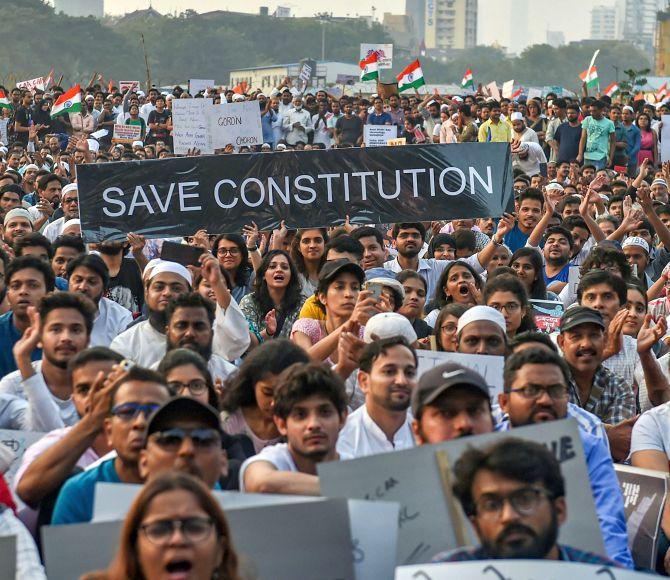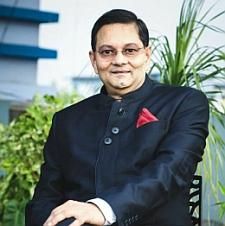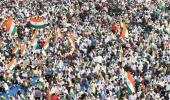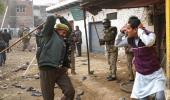'We are not a dictatorship. If the people do not desire some law, it is impossible for any government to implement it.'

Though Chandra Kumar Bose, Netaji Subhas Chandra Bose's grandnephew, is vice president of the Bharatiya Janata Party's West Bengal unit, he has been steadfast in his opposition to the Citizenship (Amendment) Act because it 'discriminates against Muslims'.
When the BJP's acting national president Jagat Prakash Nadda was busy canvassing support among residents of Kolkata for the CAA on December 23, Bose took to social media to oppose the CAA.
"Netaji was a youth leader. He would always support the youth of India," Bose tells Rediff.com's Prasanna D Zore as he explains his opposition to the CAA, the implementation of which is part of his party's manifesto.
Your views on the Citizenship (Amendment) Act are contradictory to the views of the Bharatiya Janata Party of which you are vice president in West Bengal. How do you reconcile your views with that of your party?
I support the CAA in principle, but at the same time it should not be based on any religion.
We are trying to identify people who should be given citizenship and people who have illegally entered our country and are illegal migrants.
I think that should not be based on religion; any person who is an illegal migrant should be identified and segregated. Similarly, as far as giving citizenship is concerned, it should be based on a criteria other than a religion.
India is a very inclusive country; India probably is the only country which is a land of all communities, all religions, all sexes, castes and creeds. I don't think you will find any other nation like India.
My ideology and principles are based on Swami Vivekananda and Netaji Subhas Chandra Bose. And that is based on the concept of being a Bharatiya, being an Indian, irrespective of religion, caste or creed.
How are you trying to convince your party which has already enacted this law?
The Act has definitely been passed in Parliament, but there are many enacted laws which have never been implemented.
If the Act (CAA) has to be implemented, then it needs the support of the people.
We are not a dictatorship; India is a democracy. If the people do not desire or accept some law, it is impossible for any government to implement it.
The other issue is you will have to take the state governments into confidence; state governments, which are your party governments, or in the Opposition.
Unless you take them into confidence, how will you implement it? You cannot declare President's rule in each and every state. So you need the cooperation (of these states), and for that you have to convince the respective state governments to implement this (the CAA); they have to be on the same page with you.
Nitish Kumar (whose Janata Dal-United is a constituent of the National Democratic Alliance and with whom the BJP shares power in Bihar) has opposed it (the JD-U supported the CAA in Parliament, but says it will not implement the National Register of Citizens in Bihar). Parkash Singh Badal (whose Shiromani Akali Dal is part of the NDA government at the Centre) has opposed it. So, this way, you will never be able to implement the law in different states of our country.

Why do you say this law is impossible to implement?
Of course, it is impossible (to implement) because we don't have army rule that you will force people to implement (the CAA).
Every state government is an elected government; you cannot dismiss every state government that opposes the CAA to implement it.
People would revolt (if the CAA is implemented).
You have to take a consensus of the state governments and the people of our nation, irrespective of religion. You cannot force anything on India.
You know what happened after the Emergency. Indira Gandhi had an absolute majority, but she was practically driven out (in the general election that were held after the Emergency was lifted in 1977) because she tried to force things on people.
India is a place where people have rights; there are human rights, civil rights. You have to respect all that.
Do you think the BJP will meet the same fate as Indira Gandhi's Congress post the Emergency?
Well, I hope not. I hope not because I am associated with the BJP; I admire Narendra Modiji's leadership. He is a very tall leader. He is a very inclusive leader.
But then everybody in the BJP is not inclusive. You have all types of people in the party.
Modi is giving proper leadership; he has to probably give more effort now to see that inclusive values and the spirit of India are maintained.
Do you think Mr Modi is being misled by other BJP leaders because on the face of it, the prime minister is an aggressive votary of the implementation of the CAA?
It will not be proper for me to comment on such matters. Modi is a very experienced leader and I don't think he can be misguided so easily.
You see, in principle, the CAA is fine. You need to have a citizen's act; there is a citizen's act, but it needs certain amendments.
There also has to be identification of illegal migrants and that exercise needs to be conducted. I totally support that.
My only objection is that India is a land for all communities and religions. You cannot exclude Muslims or anybody else. You must include Muslims.
Probably no Muslim would come to India taking advantage of the CAA, but that is beside the point.
Why exclude the people of Baluchistan and the Ahmediyas of Pakistan who though being Muslims are also persecuted in that country? What about them?
They may not come because they go to Europe. But then you have to give that option to them. You cannot block them based on religion.
Do you agree with implementation of an NRC?
Because of the controversy the NRC has generated, the government is saying the NRC will not happen immediately.
What I feel is identification of illegal migrants must be done. That is essential because there is a national security angle to it, because if all kinds of jihadis and terrorists enter (India), there will be no control.
West Bengal has a porous border with Bangladesh. People just walk in. So, we need to identify illegal migrants. Now, how would you do that?
NRC, I suppose, is an exercise in order to identify and segregate the migrants who have illegally entered our country.
It is important, but it cannot be religion-based. An illegal migrant is an illegal migrant, irrespective of religion.
Have you spoken with Mr Modi about what you find objectionable in the CAA and how it needs to be corrected?
I have given my proposal (to Modi); I have sought an appointment with the honourable prime minister and also the home minister (Amit Anilchandra Shah) in the first week of January.
Hopefully, I will get an appointment and I will explain to them (the flaws in the CAA).
I am not against the party or government. I am with the people of India. I will only voice the people's voice when I meet him.
What if Mr Modi and Mr Shah reject your proposal? The CAA and NRC are part of the BJP's manifesto after all.
My job is to conscientiously express what I see is good for India and suggest proposals based on that view.
If the party doesn't agree, then I will decide (upon the next course of action) when that stage comes. I don't want to say anything prematurely; I will cross the bridge when I will arrive at the bridge.
If Swami Vivekanand and Netaji Subas Chandra Bose were alive today, do you think they would have been at the forefront of the anti-CAA/NRC protests happening across the country where students are leading these protests and not any political leaders?
Firstly, if Netaji had come back to India, there would not have been any division (of India). We would have been an undivided India. We would never have had Pakistan or Bangladesh.
If Netaji were alive, this problem would not have arisen. He would have come back and continued as the prime minister of India. It is very unfortunate for India that he did not come back and opportunist leaders of that era divided the nation for their vested interests.
(Pandit Jawaharlal) Nehru wanted to become prime minister of India and (Mohammad Ali) Jinnah wanted to become prime minister of Pakistan.
If Swami Vivekananda and Netaji, whose ideology and philosophy you believe in, were alive today, would they have been with the students agitating against the CAA/NRC or with the government that implemented the CAA and is now pushing for the NRC?
Netaji was a youth leader. He would always support the youth of India.
He was very much with the students when he was at Presidency college or when he was at Cambridge university. He was always a student leader.
He could successfully mobilise the youth of India to fight for the freedom movement. So, naturally Netaji would have stood with the (protesting) students of our country.











 © 2025
© 2025